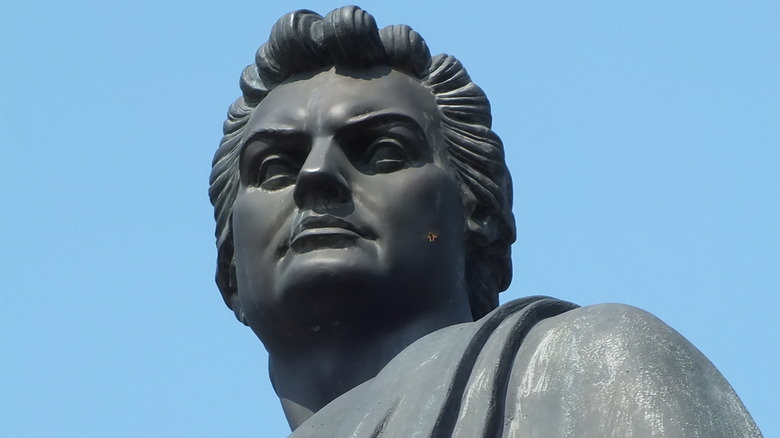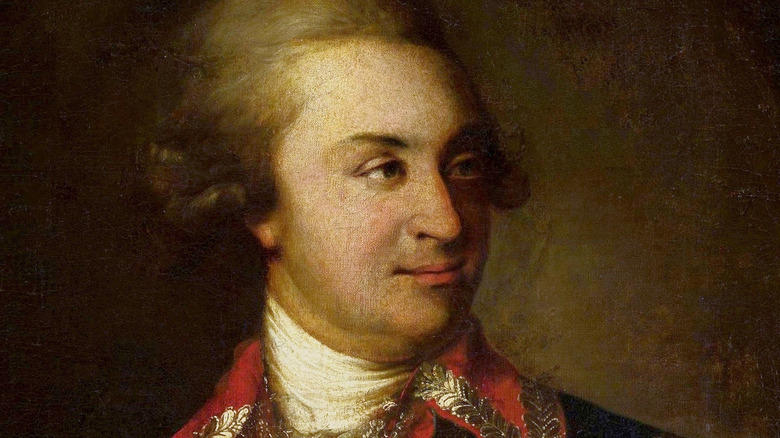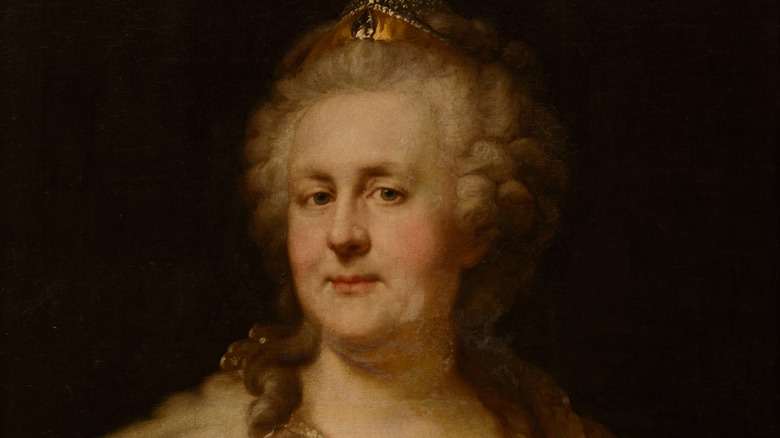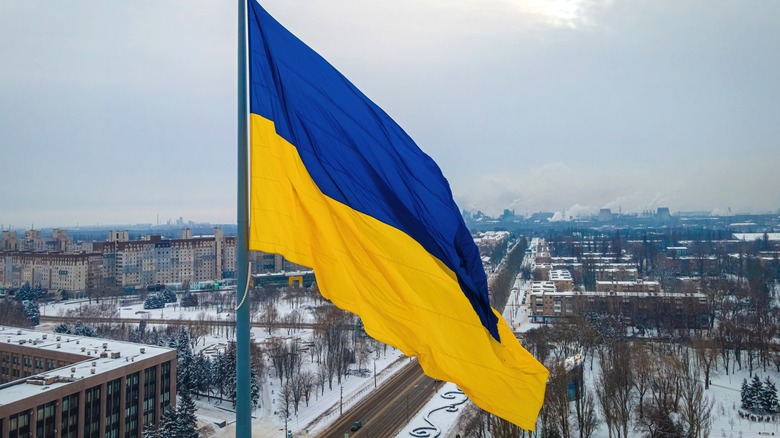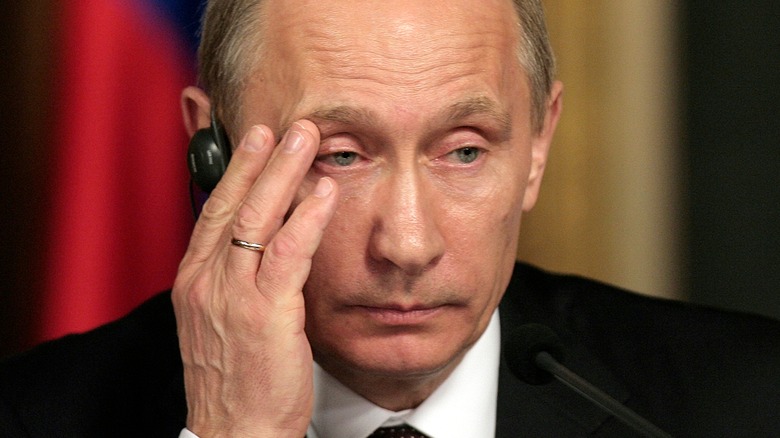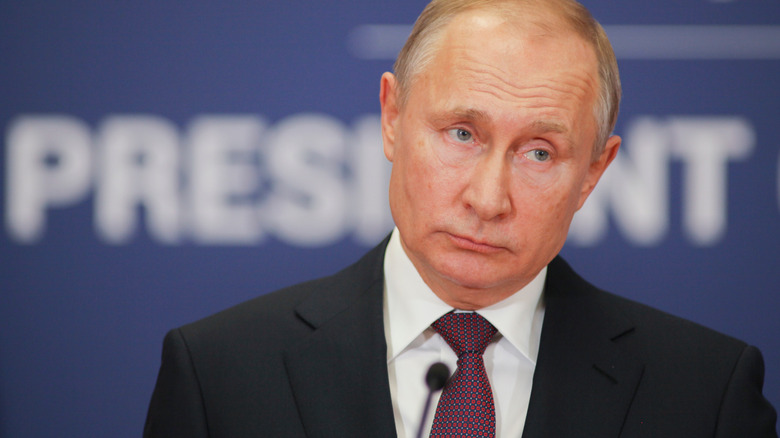Russian Troops Stole The Body Of Catherine The Great's Lover From His Tomb In Ukraine
Kherson, Ukraine is being occupied by proxy rulers of Moscow. In October 2022, they announced that they had ventured into the white marble grave inside St. Catherine's Cathedral and seized the remains of Prince Grigory Aleksandrovich Potemkin — the lover of Catherine the Great. Potemkin was known for his involvement in Crimea's annexation in 1783 and founding "New Russia," or what is now southern Ukraine, per The New York Times. The move plays into Russian President Vladimir Putin's attempt to absorb Ukraine into Russia to create "one people" (via Insider). The remains of Potemkin now reside deeper in Russian territory.
The head of the Kherson region, Vladimir Saldo, stated of the body's removal (via Business Insider), "We transported to the left bank the remains of the holy prince that were in St. Catherine's Cathedral." Currently, Putin advances the belief that Ukraine has never been a sovereign nation, and whenever it attempted independence, it ultimately failed. The act was not without controversy, as some historians claim that Potemkin would not have been in favor of Putin's nationalism. But it served as a powerful political statement — by taking ownership of the prince's body, Putin attempted to take ownership not only of Ukraine but also its history.
Potemkin's Rise to Power
Grigory Aleksandrovich Potemkin was born in 1739 in Chizovo, Russia. He was a Russian army officer who became a powerful leader in the Russian empire and the lover of Russian Empress Catherine the Great (via Britannica). He received his education at the University of Moscow, after which he entered the Horse Guards in 1755 — a calvary Regiment in the Russian army. Although he wasn't of equal nobility to Catherine, his presence in the elite Regiment won the attention of the licentious Empress. And when he came to her aid during a coup in 1762 (via History), the pair began a legendary love affair that continued until he died in 1791 — at which time Catherine had him interred in Kherson, per The New York Times.
At the start of the affair, Potemkin was 10 years younger than the 44-year-old Catherine, and he was one of a long succession of lovers she had, including during her marriage to Peter III. She referred to him as her "Twin Soul," which seemed fitting since Potemkin proved to be relentless in his quest for power, and they shared a love for politics, power, and sex (per History). He divided the opinion of the imperial court, with many disapproving of his egotism and alleged boorish nature. But this didn't stop the statesman from pursuing colonization with the aid of the Empress.
Annexation of Crimea
Catherine the Great, along with Grigory Potemkin, aimed to Westernize the East after she felt her husband, Peter III, failed to continue the tradition begun by his grandfather Peter the Great. She drafted new law codes and enlisted the help of the people — including ethnic minorities — to show that she created the laws with everyone's interests in mind. However, she was simultaneously active in suppressing peasant uprisings and didn't hesitate to expand into Ukraine. By going forth with the expansion, she risked her reputation. Her armies were fighting with the Ottoman Turks for rule over the Baltic Sea, an effort begun by Peter the Great, per Smithsonian.
At the start of the war between the Turks and Russia, Crimea was relatively autonomous but still had conflicts with the surrounding empires of Russia and Polish Lithuania. The area was subject to frequent raids and human trafficking, which lessened during Russia's expansion in the south, but they only ceased once Crimea was annexed in 1783. Catherine's reign expanded over the years across Ukraine, doing little to help the peasantry, as she favored a serfdom economy and thus stole the freedoms they had prior, per Smithsonian.
Relationship to Modern Ukraine
Some comparisons have been drawn between Catherine the Great, Grigory Potemkin, and Vladimir Putin, since the three were similarly preoccupied with gaining sovereignty and more power for the Russian Empire. Since 1783, Ukraine has been ruled by multiple powers, including the Austro-Hungarian Empire, Poland, and the Soviet Union, per Smithsonian. In view of their history, Ukraine appears to be a battleground for empires bent on expanding their territories, making the fight for sovereignty ever-present.
The city of Kherson stands as a reminder of what has been a trying battle for Ukrainian independence. Halyna Luhova, a member of the Kherson city council, said (via CNN), "People in the occupied territories with whom I communicate say that there are more Russian soldiers on the city streets than the residents." The Kremlin-backed leaders in Kherson sent out a message that Ukrainian rebels would attempt to retake the city, prompting many panicked residents to relocate deeper into Russian territory. Meanwhile, Russia had made plans to send more troops to strengthen its position, per CNN.
Putin Stands in Potemkin's Shadow
Eastern Ukraine saw a burst of conflict in 2014, not long after Russia once again annexed the Crimean Peninsula (via the Global Conflict Tracker). People of eastern Ukraine in favor of separatism from Russia held referendums of independence, thus spurring intense conflicts between Russian and Ukrainian forces, although Russia initially denied their involvement. In 2015, four countries tried to end the conflict, but the negotiations were unsuccessful. The following year, NATO sent four battalions through Eastern Europe to protect against future aggression from Russia. U.S. involvement was quickly on the horizon as well — they sent weaponry to Poland.
In February 2022, Russia undertook a large-scale invasion. Putin claimed there was widespread genocide of Russians in Ukraine and increased military deployments to the country over months. Along the way, Russia launched cyber-attacks on government websites and banking sites (per Global Conflict Tracker), and the destruction of antiquities and historical landmarks has blighted Ukraine's cultural history (via CNN).
Ukrainian History Becomes Putin's Story?
There is debate about whether Grigory Potemkin would have been much of an admirer of Vladimir Putin. Some historians see Potemkin as an imperialist who nevertheless considered people from many nationalities. Others believe Catherine the Great and Potemkin were mainly concerned with their gains, only giving the impression they were concerned for the people in an effort to gain support. Notably, Putin depended on the history of Potemkin and Catherine's annexation of Crimea when he did the same in 2014 (via Forbes).
But Putin, while attempting to frame himself as a 21st-century Potemkin, did not crush Ukrainian resistance with the fervor of his predecessors. In addition to a glacial invasion, troops were recently withdrawn from Kherson. Although the battle for Ukraine is far from over, it's been argued that Putin is currently living a myth where his aids feed him questionable information that reflects what he wants to hear, per The Washington Post. Moving forward, Russia intends to leave Ukraine cold and vulnerable in the winter months, but the country plans to persevere and recover its losses in the interim (via BBC).
